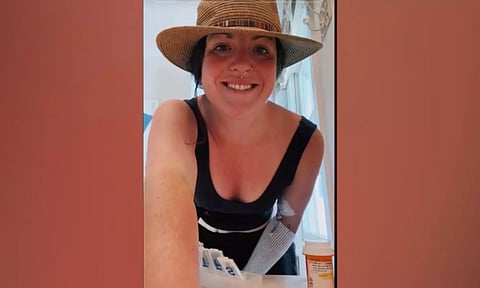

NEW YORK: A 30-year-old US woman suffering from a rare genetic heart condition, where she has no pulse, is surviving on a set of batteries, according to a media report.
TikToker Sofia Hart from Boston has irreversible dilated cardiomyopathy -- a condition where the heart cannot pump blood effectively because the left ventricle, the main pumping chamber, is enlarged and weakened.
She now lives with a life-saving Left Ventricular Assist Device (LVAD) -- that keeps her heart pumping, while she awaits a heart transplant, People.com reported.
While Hart is able to do her daily chores like brushing teeth, making breakfast like everyone else, she remains connected to a wall outlet that keeps her alive.
"That cord is pretty long, and I have mastered living in places where I can get around on that cord," Hart said.
When leaving the house, she plugs her LVAD into batteries, and carries a spare set of batteries around with her as well, she showed on Tik Tok. It’s why she started documenting her life on TikTok -- and her account quickly took off, garnering millions of views as she explains that she has "no pulse".
"I run off batteries," she said in one video with 1.5 million views. She discovered her condition last year while working at a horse farm and thought of it as Lyme disease, since she worked outside and could have easily been bitten by a tick that carried the bacteria.
"I started getting really achy and so fatigued," she was quoted as saying to People. "It's like a fatigue that you can't really describe. I wasn't tired in my brain, but my body was so tired.
"I was out of breath even from driving."
Seven years earlier, Hart's twin sister Olivia had suffered heart failure and had to get an LVAD device until her transplant in 2016. But genetics wasn't thought of as a potential cause until Hart also became ill.
Now they know they both have the TNN variant, which the National Institute of Health says has "younger ages of diagnosis and poorer clinical outcomes", the report said.
Hart was given the same course of treatment at age 29 that her sister was given at 22: Live with an LVAD until she could get a transplant. "If I knew then what I know now, I would have stayed. I would have put my feet up, like, ‘Keep me here as long as you want,’ because life is very tough outside of the hospital as a medical patient," Hart said.